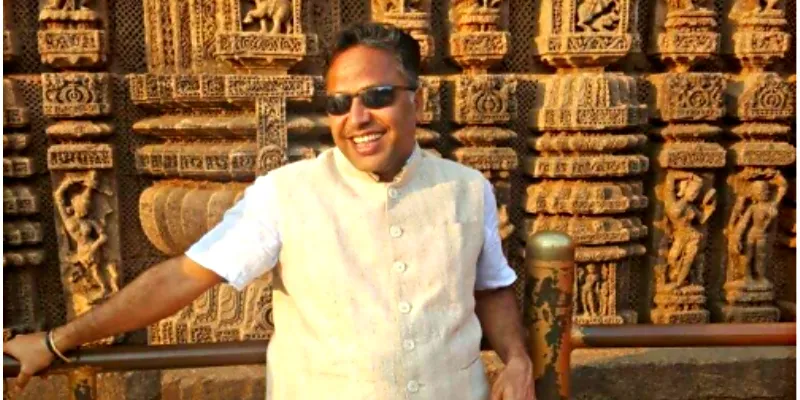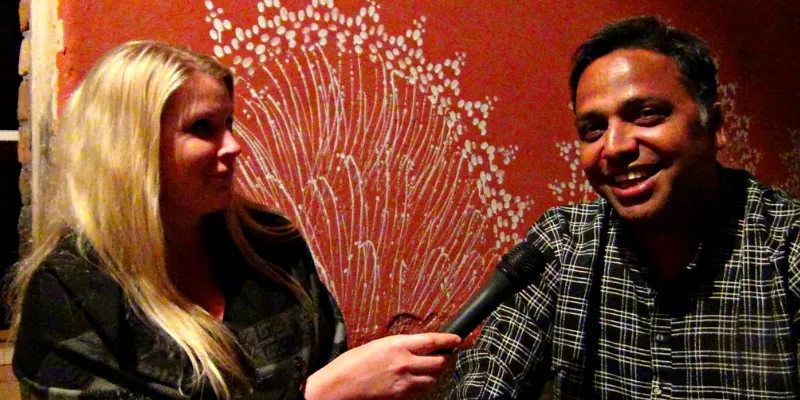Why Yugabrata Kar transformed this tribal hamlet in Odisha into an international tourist attraction
Odisha’s Koraput valley didn't always catch your eye on a map. It wasn't always a traveller's idea of the ideal place to nestle in while looking for an unabashed and unpretentious Indian sojourn. That tourists from Spain, Italy, and Germany would queue up to visit seemed like an impossibility — the place had trouble piquing the interest of its own inhabitants. Waning cottage industries meant the destruction of their ancestral livelihoods, leaving able-bodied, skilled, and competent young people absolutely no reason to stay. That was until Yugabrata Kar saw how an aesthetic facelift coupled with positive reinforcement for their timeless culture could do wonders for its economic landscape. The tool he used to bring about this change was ecotourism.

Yugabrata, before
After having topped the state in the mechanical engineering diploma course, he chose to study tourism and hospitality management, revealing his interest in the area. Born in the holy city of Puri, which attracts a large number of tourists from across the globe, he was inspired first to be a traveller and then a tour operator.
He started off as a sales engineer for the agriculture division of a reputed company that required him to travel to remote villages to sell agricultural pumps. “On my visits to these remote areas, I noticed two things — one was the local culture getting eroded due to the introduction of technology such as the mobile phone and television, and the second was that the locals were immersed in poverty due to the waning demand for their traditional sources of livelihood. The youth in these communities were reluctant to pursue their ancestral professions and were getting more attracted towards big-city gigs,” he recalls.
Yugabrata after...
He went on to travel to over 26 countries where ecotourism was thriving. This first ignited the spark in him to quit his job and tap into the segment of ‘responsible tourism’. He trained in the nuances in Thailand, and was determined to replicate the model in India, starting first with his beloved homeland, promoting Odisha's local culture and traditions as attractions for the world.
As the name suggests, ecotourism is nature-inspired tourism, keeping in mind the conservation of the environment while creating economic opportunities for local people. With a vast forest cover, constituting 20.64 percent of the country's geographic area, there is scope to develop 160 national parks and 698 wildlife sanctuaries (source), creating immense opportunity for ecotourism in the country.
With technology reaching remote areas of the country, local tribes tend to get influenced by other cultures — global and local — losing the essence of their own culture in the process. Yugabrata’s ‘Desia’ comes in as an initiative to encourage the different tribes (primarily the youth) in the environmentally rich Koraput valley of Odisha to make their ancestral and traditional way of living the source of their livelihood. Apart from creating employment as operating staff, the camp also functions as a marketplace for these tribes living below the poverty line to generate income by selling tourists their handcrafted goods. “It works as a win-win for both, as the tourists get to absorb the beauty and serenity that nature has to offer in this region and at the same time experience the rich cultural heritage of various local communities,” says Yugabrata.
Desia ecotourism camp
Having self-financed the venture with a loan from Bank of Baroda, Yugabrata took his leap in November 2014 and laid the foundation stone. The site, with its two cottages, both equipped to entertain international guests with modern amenities as well as enthral them with a boutique Indian décor, is a modest one. The artists of Shantiniketan were brought on board to doll up the property. During construction, more than 100 families were employed for several activities based on their skill.
To get the venture off the ground post construction, 10 local boys and girls were trained at a tourism institute in Puri, and they now look after the day-to-day operations. “Two girls were sponsored for nursery teachers’ training at Awake and Shine School near Kalimpong, as we intend to open a preschool to make the foundation of the children stronger and to involve more families in this project,” explains Yugabrata.
Similarly, art camp and jewellery-making workshops have been some of the other initiatives instated to develop skills of the local women.
And this is barely half the experience on offer; every tourist not only gets to live amidst the local tribes’ townships, but also dine and converse with them, swap stories of their respective lands, not to mention visit nearby tourist spots.
Apart from creating employment and a source of income for the local tribes, part of the revenue earned is used in selected sectors such as education, environment, and empowerment — Yugabrata’s three Es. Some of these initiatives include providing scholarships to deserving students, financial assistance and regular opportunities provided to local youth to perform local music and dance, craft training centres, empowerment in agriculture and awareness campaigns to increase the number of plantations, as well as the harmful impact of using plastic bags on the environment.

Bumpy beginnings
The biggest obstacle for Yugabrata in mobilising the local communities was the local political unrest and disturbed law and order situation in the area, due to several incidents of violence from clashes between Maoists and police personnel. “Apart from this, the stringent government regulations on foreign tourists visiting the Primitive Vulnerable Tribal Groups (PVTG) area, was also a major hurdle,” Yugabrata says.
The location of the camp is also extremely remote, making it very unattractive for investments in the hospitality sector. “We did it because our motive wasn't to make money, but to empower the local community and encourage them to preserve their culture by using tourism as a tool,” explains Yugabrata.
What kept them going in these hostile conditions was the dogged faith of the local communities in this project. “This faith did take its time to sink in, considering that the local people had a lot to lose if the project failed. Hence, establishing the trust of the various local tribes in Desia is something that I consider to be my biggest milestone till date,” he gleefully says.
But happy endings
Today, Yugabrata has created employment for more than 40 people through various projects like tour operation, conducting heritage tours, his restaurant Wildgrass, and of course, the Desia Eco-Tourism Camp. All these projects are based on the principles of responsible travel and focus on people and life.
Next up, he plans to add a travel lounge to the Desia Eco Tourism Camp, for which he is running a crowdfunding campaign on Wishberry. “This travel lounge will function as a space for the tourists to relax, kick back with a book, listen to tribal music, and even try their hand at local craft,” he teases.
Apart from the lounge, Yugabrata also has larger initiatives such as constructing a primary school, yoga centre, crafts centre, organic farm, and various other women empowerment projects, depending on his resources, on the anvil.







